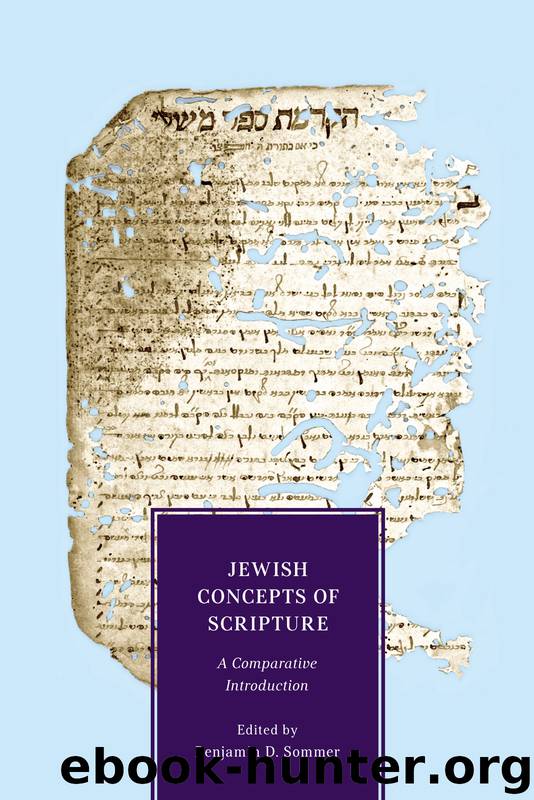Jewish Concepts of Scripture by Sommer Benjamin D.;

Author:Sommer, Benjamin D.;
Language: eng
Format: epub
Publisher: New York University Press
Published: 2012-04-14T16:00:00+00:00
Torah as Intermediary
We have seen that the Torah as God’s name serves as an intermediary, allowing God to descend into the world. We can conclude this survey by noting some texts which propose movement that goes in the other direction: the Torah allows human beings to ascend to a heavenly realm.
Some kabbalists developed a theory reminiscent of the great chain of Being. Here the lower realms are the impression (Hebrew, roshem) of the higher ones, with God at the top. A related theory defines the Torah as the souls of the people of Israel and considers that the Torah consists of the divine names. This triune vision enables the passage of the soul, via the Torah and the divine names, to God.40 The following passage is one major example of this view, taken from Rabbi Isaiah Horowitz’s early seventeenth-century work Shnei Luot Ha-Berit (Ha-Shelah), a widely read classic of somewhat more popular kabbalah:
The Holy One, Blessed be He, and the Torah and man are linked to each other. . . . As the sages of truth [the kabbalists] said, the Torah is the impression of the Divinity, and man is the impression of the Torah, since the revelation of His divinity is the secret of His holy names, and the Torah is, in its entirety, His names. . . . The Torah consists of the souls of Israel, both the revealed Torah . . . and the primordial, preserved Torah, which is the root of the souls of the chosen few. And man is the impression of the Torah. The vast majority, almost all of them, are the impression of this revealed Torah, . . . and the rank of the soul of the chosen few is from the primordial Torah.41
Unlike the more formalistic approaches discussed earlier, such as that of Joseph of Hamadan (which presuppose some type of distance between the isomorphic elements), Horowitz assumes a much more organic linkage. There is something congenital in the three elements mentioned in the preceding passage in that the entity that causes the impression still lingers in the imprinted entity. This is why the study of the Torah involves perhaps less a movement beyond a fallen plight than an actualization of a divine aspect found in man. Following Horowitz (and others including Menahem Azariah of Fano and Meir ibn Gabbai), Rabbi Ze’ev Wolf of Zhitomir, a late eighteenth-century Hasidic author, presents a Platonic process of ascent to the supernal source, deemed possible by the means of the Torah:
The Torah is the impression of the divinity, and the world is the impression of the Torah. . . . An enlightened person concentrates his heart, spirit and soul to divest everything in the world from materiality, and cause the embodiment of the spiritual form . . . by his comprehension of the embodiment of the divinity, which dwells there, within the letters of the Torah, which are embodied as well in the entirety of the world, which was created with the Torah, and they animate everything.
Download
This site does not store any files on its server. We only index and link to content provided by other sites. Please contact the content providers to delete copyright contents if any and email us, we'll remove relevant links or contents immediately.
| Haggadah | Hasidism |
| History | Holidays |
| Jewish Life | Kabbalah & Mysticism |
| Law | Movements |
| Prayerbooks | Sacred Writings |
| Sermons | Theology |
| Women & Judaism |
The Secret Power of Speaking God's Word by Joyce Meyer(2795)
Man's Search for Meaning by Viktor E. Frankl(2562)
Mckeown, Greg - Essentialism: The Disciplined Pursuit of Less by Mckeown Greg(2343)
MOSES THE EGYPTIAN by Jan Assmann(2301)
Devil, The by Almond Philip C(2226)
Unbound by Arlene Stein(2194)
The Complete Dead Sea Scrolls in English (7th Edition) (Penguin Classics) by Geza Vermes(2164)
I Capture the Castle by Dodie Smith(1921)
Schindler's Ark by Thomas Keneally(1768)
The Invisible Wall by Harry Bernstein(1713)
The Gnostic Gospel of St. Thomas by Tau Malachi(1695)
The Bible Doesn't Say That by Dr. Joel M. Hoffman(1614)
The Secret Doctrine of the Kabbalah by Leonora Leet(1544)
Political Theology by Carl Schmitt(1509)
The Jewish State by Theodor Herzl(1477)
A History of the Jews by Max I. Dimont(1451)
The Dead Sea Scrolls Bible by Martin G. Abegg(1433)
The Book of Separation by Tova Mirvis(1428)
Oy!: The Ultimate Book of Jewish Jokes by David Minkoff(1301)
